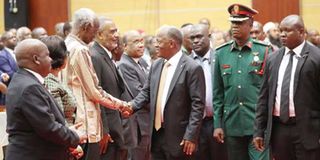Mkapa on presidential term-limits

President John Magufuli shakes hands with Judge Joseph Warioba, who led the Constitutional Review Commission, as former First Vice President of Zanzibar Seif Sharif Hamad looks on. This was during the launching of Mkapa’s book in Dar es Salaam on Tuesday. PHOTO | ERICKY BONIPHACE .
What you need to know:
- The former Head of State writes that he “was very tense” when former president of Zanzibar, Salmin Amour, wanted to extend his term beyond what the constitution allowed him.
Dar es Salaam. Former President Benjamin Mkapa has criticised some African heads of state for clinging to power even after the expiry of their respective constitutional term limits, saying the practice does not only complicate governance of the respective countries but also poses a risk to regional peace, security and stability.
Mr Mkapa’s warning, given in his autobiography titled My Life, My Purpose: Tanzanian President Remembers and launched on Tuesday. In the memoir, Mr Mkapa opens up about his life and experiences as a Tanzanian leader.
The criticism comes on the heels of mounting voices in various forms that suggest that the constitution of Tanzania should be amended to allow President John Magufuli stay longer than the two-five year term. President Magufuli has, nonetheless, ruled out any possibility of him going beyond what is currently stipulated in the constitution.
Expressing his disappointment over what has happened elsewhere in the region in relation to the issue of term limits, Mr Mkapa, who has worked as a mediator for the Inter-Burundi Dialogue, says: “Looking at neighbouring countries, we have seen leaders trying to retain power beyond their allotted term.” The Inter-Burundi Dialogue is an EAC initiative aimed at resolving political tensions caused by the 2015-controversial Burundian elections.
“If you’ve served well, yet choose to remain beyond your term, which results in a threat of unrest and violence, why do you, as a leader, want to see that violence erupt? Why spoil your record of leadership and create a crisis, why?,” asks Mr Mkapa as if addressing leaders of Uganda, Burundi and Rwanda, who have allowed changes to their respective constitutions to extend their stay.
Close to home, Mr Mkapa writes in the 320-page memoir that he “was very tense” when former president of Zanzibar, Salmin Amour, wanted to extend his term to an unconstitutional third term, a move he said, if successful, would have been “catastrophic for Tanzania.”
Mr Mkapa says that “there were no extraordinary reasons” for Dr Amour to do so, and although he didn’t want to appear dictating to the Zanzibaris, “I was determined not to have the constitution changed.”
Beyond the issue of term-limit, however, Mr Mkapa also expresses his support for the need to strengthen the checks and balance in the country, describing the principle of separation of powers, for example, a “vital” one especially for a developing country like Tanzania.
This also comes amidst the growing debate in the country around the question of whether or not the constitutional safeguards are enough to ensure checks and balances at a time where one pillar of the State, the Executive, is seen to overreach itself at the expense of accountability and good governance, a claim the Magufuli administration denies.
“There must be a structure which can mitigate a president’s power, or at least provide for a time for a president to rethink,” argues Mr Mkapa, after acknowledging that under the current constitution the president has excessive powers vested into him. “Perhaps this is where a second parliamentary chamber could be useful, it could offer the opportunity for those who have had substantial experience to review bills. [It] could at least quietly warn of any potential for a negative impact from a proposed bill.”
In the same vein, and as analysts have raised concerns lately over what they consider to be the repression of Civil Societies Organisations (CSOs) through activities by the State, something they think hinders their efforts to support governance, Mr Mkapa writes in his book that, to ensure they serve the purpose better, CSOs should perhaps shift from their “simplistic approach” of investing in “overzealous criticism” of the government to the “thoughtful” one which “presents alternatives.”
The emphasis on criticism, Mr Mkapa argues, “Reflects the weak or immature state of many civil societies organisations,” urging them to stress on constructive criticism that he thinks “would be more helpful.”




